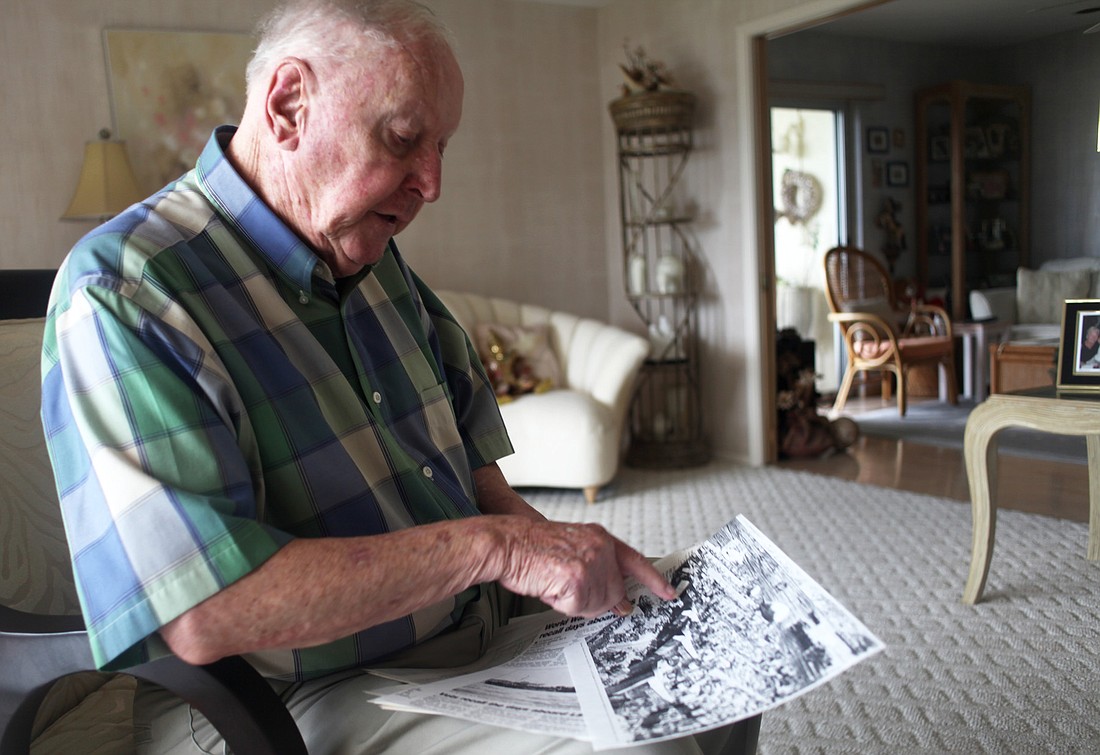- November 28, 2024
-
-
Loading

Loading

"At the recruiting center in Great Lakes, Ill., they asked me a couple of questions. One, he asked, ‘Have you ever been in a drugstore?’ I said yes. And two, ‘Did you ever take an aspirin?’ I said yes. He said, ‘OK, Medical Corps.’ So, they sent me to hospital corps school. Later, I was put aboard an LST, a large slow tank, with some other medics and crew members, and we picked up some weapons and ammunition before joining a convoy in Nova Scotia. We got based in Southampton, England, and stayed there to help build temporary hospitals because we knew when D-Day started, there would be wounded and there’s no way those English hospitals could take care of them. On June 6, 1944, when I was 19 years old and scared out of my wits, we landed on Omaha Beach. We were there about eight hours after the rangers originally scaled up the cliffs and started taking out the enemy. We went out onto the beach in pairs because we knew we’d have to carry some of them back on stretchers. Once we got them back, we sorted out who would need surgery, a quick surgery, and the rest we put onto bunks and cared for them the best we could. … We made three trips, and then it wasn’t necessary any longer. When we first landed on the beach and you could hear cannons and bombs and rifles and machine guns and all that business, first thing you wanted to do was run and hide. But when you’re in and you know you have a responsibility and a job to do, you say, ‘I’m gonna do this to the best of my ability.’ That’s what we did.”
— Bill Kelley, former U.S. Navy medic
"I’m a survivor of Hitler Germany, and we escaped in 1940. I was 14 years old and in Detroit, and, unfortunately, it was very shortly thereafter that we got the news that my grandparents had been gassed in Auschwitz. But on D-Day, for the first the time, I didn’t feel afraid of Hitler conquering America. And I felt the war was over. It was a meaningful event for me.”
— Eve Kommel
"I was 9 years old at that time. What I remember clearly about it was on the morning of June 6, we were all gathered together in a community area, in our auditorium, and told about D-Day. We were asked to pray for those involved and for their success and for a quick end to the hostilities.”
— Former Longboat Key Mayor Jeremy Whatmough
"When you look at that statue in Sarasota, that was multiplied a hundred times in New York City on D-Day. At the time, I lived there and everyone went to celebrate in the city, so that statue was seen everywhere. It was very moving and the idea was to learn not to have wars anymore. And we’re still trying to figure that out. I hope we do in my lifetime.”
— Virginia Sanders
"I was already in Switzerland when I heard the news. We arrived there in late December ’44. But, before that, I was in Bergen-Belsen, a concentration camp in Germany. By that time, we were rescued and in Switzerland. I was still a little girl, only 7 years old. But I remember my mother crying and everyone was just so happy. I didn’t quite know the ramifications or what it meant, but I remember everyone being so happy.”
— Rifka Glatz, Holocaust survivor
"I was in Louisiana at the time, and it was great to learn about it. We only knew the details as they were provided by the news media. When we arrived in England at our base, we heard more about the missions flown from the aircrews who had participated. For the most part, they were described as ‘milk runs.’ There were, however, casualties, and we witnessed names from our 344th Bomb Group on headstones at Normandy during our visit in 2002. During the war, on training flights when no missions were scheduled, we did fly over the Normandy beaches and there was a huge amount of debris from landing crafts still visible. It was unbelievable how such a massive operation could be planned at the time with communication facilities as they existed.”
— Jack Bornhoeft